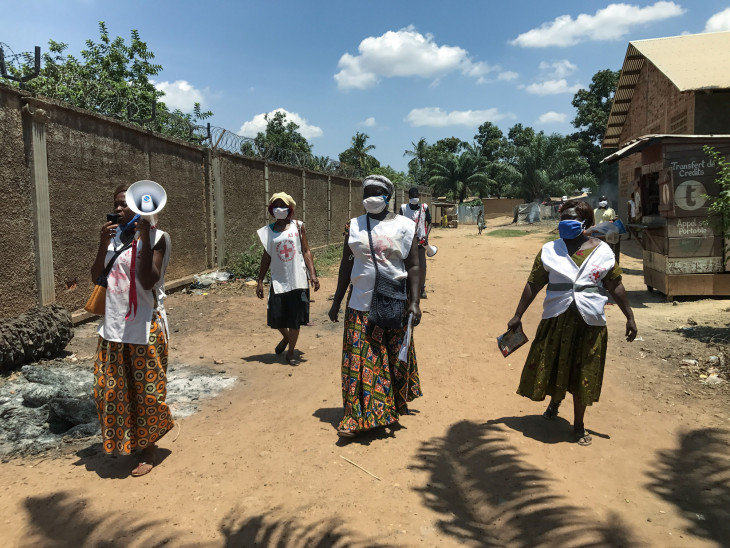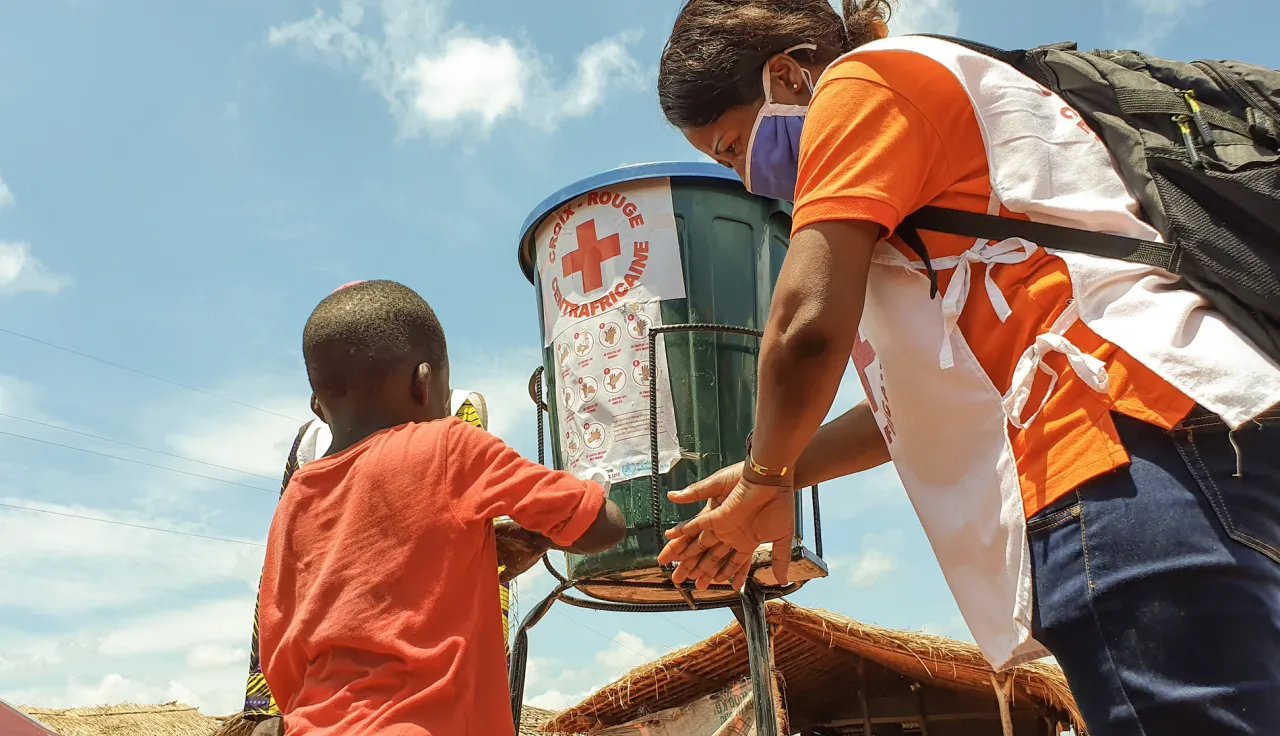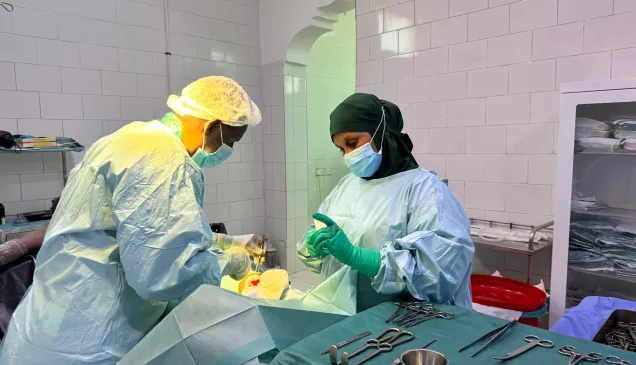Bangui (ICRC) – The struggle against COVID-19 is intensifying against the background of the alarming spread of the disease in the Central African Republic (CAR). Although the number of recorded cases has exceeded 4,500, some people still do not believe that the disease exists, thus jeopardizing efforts to counter it. Complying with hygiene measures and social distancing remains difficult for many people living either in displaced person camps or in overcrowded prisons, for whom soap and water are not readily available.
The International Committee of the Red Cross (ICRC) is working with the Central African Red Cross Society to raise the population's awareness of the disease and acquaint people with barrier gestures, as well as helping health facilities and prisons to introduce measures to prevent and curb infection in an effort to stop the virus spreading. COVID-19 is yet another threat compounding the consequences of conflicts, violence and a lengthy crisis, all of which make the daily life of thousands of Central Africans even more precarious.
"This is certainly not the time to halt action. Assistance and services which were vital before are even more crucial today," said Bruce Biber, head of the ICRC delegation in the CAR. "We must strike a balance between what we need to do to meet humanitarian needs and the precautions which must be taken so as not to become a disease spreader. We must also take care not to place our staff at risk."
Adjusting emergency programmes to deal with the health crisis
By adapting to the new reality and taking all the necessary precautions, such as wearing a mask, washing hands and keeping a distance, it has been possible to organize the distribution of seed, food and agricultural implements to some 10,000 families (or more than 50,000 people) who have returned to their homes, or who are vulnerable in other respects, in the prefectures of Ouham, Haute-Kotto, Basse-Kotto and Mambéré-Kadéï.
"When I came back to my village after it was attacked last year, my field had been destroyed. This seed distribution has given me some hope. I have begun to plough my field and I hope for a harvest in August," said Modestine, a farmer in Markounda, Ouham. Until the harvest is ready, she will be able to cook with the rice, beans, oil, salt and super cereal, which she received along with the seed.

Modestine, from Maïnodjio in the Ouham region, is a farmer and mother of seven children. She lost everything when her village came under attack. She has recently resumed farming after receiving seeds and tools. Félicien MAMADOU/ICRC
A plastic kettle and a kilo of soap was also given to each household, after it was primed about the dangers of the disease and instructed in barrier gestures. Every interaction with communities, ranging from the repair of water sources to the distribution of assistance, is used to make sure that they have the requisite information about COVID-19 and how to protect themselves.
More than one million people informed about COVID-19 and barrier gestures
In addition to the assistance given to communities, more than 900 community, religious or civil society leaders, weapon bearers, local authorities or community members were alerted to the dangers of the disease in order that they in turn can pass on the right information. They learned handwashing technique and received posters, leaflets, handwashing equipment, kettles and soap so that they can launch and continue awareness-raising activities in their communities.

More than 400 Central African Red Cross volunteers are at the forefront of the fight against COVID-19. Christelle BOUA/ICRC
The ICRC volunteers, supported by the Central African Red Cross Society, and other members of the International Red Cross and Red Crescent Movement in the CAR, have also swung into action to raise their fellow citizens' awareness. They are of central importance to the response: on six days a week, volunteers tour districts with megaphones or in motor caravans, or they set up mobile handwashing stations near markets or sites for displaced persons. It is estimated that more than one million people have been reached through these awareness-raising activities.
Before COVID-19 arrived in the CAR, a first aid training session was organized in communities to teach live-saving procedures. The community representatives who received this instruction are now being trained as COVID-19 awareness campaigners. They also learn how to make affordable handwashing stations with local materials that anyone can obtain - a five-litre water container and four wooden sticks are all that is needed.
Facilitating the availability of drinking water
For much of the population in the CAR obtaining potable water is a daily challenge. Sometimes the trip to the water source is long and dangerous and the water is not always drinkable. In these circumstances it is hard to apply preventive measures properly. In Gamboula, in the south-west of the country, the ICRC has just rehabilitated the village borehole. Delphine hopes that this will mean that other families are spared the tragedy that befell hers.
Before this borehole worked again, I had to walk more than a kilometre to a spring where the water was so dirty that our children regularly fell ill. My one-year-old daughter suffered from diarrhoea. I took her to hospital but the medical staff could not save her.
This year the ICRC has built or repaired 80 boreholes or well in 50 villages and in two sites for displaced persons. And the work is continuing. Chemicals needed to treat water, along with material and technical support, have been supplied to the Société de distribution d'eau en Centrafrique (SODECA) (the water distribution company) in order to improve access to water in the towns of Bangui, Bouar and Ndélé.
Lives are saved every day in Kaga-Bandoro hospital while it prepares to deal with COVID-19
The pandemic is not stopping people from catching other diseases or needing a doctor to treat a wound or attend a birth. This year, almost 39,000 people have already received free treatment in the paediatric and maternity services of Kaga-Bandoro hospital and the Grévaï and Ouandago health centres in Nana-Grébizi. More than 1,200 mothers received assistance during childbirth.
On top of dealing with routine health problems, the medical staff must now prepare to care for potential COVID-19 patients. In order to help the staff of health facilities and the health services of prisons receiving the ICRC support, 15 members of the medical staff have been trained in the clinical management of persons infected with COVID-19, with the backing of the Ministry of Health and Population and the World Health Organization.
Staff have been provided with personal protective equipment, such as masks, aprons and gloves, in order that they can continue their work in complete safety. A one-way system separating people entering and leaving the three health facilities has been introduced together with measures to prevent and control infection, including infrared contactless thermometers and handwashing stations. Two tents with eight extra beds have been erected at Kaga-Bandoro hospital to facilitate triage and the management of persons suffering from the virus, and also to contend with the greater influx of malaria patients due to the rainy season. Staff in the four healthcare facilities in Bangui, where the pandemic is spreading fastest, are being provided with additional handwashing stations, chlorine and gloves.
The psychosocial programme for victims of violence, including sexual violence, is continuing in the displaced persons camps in Kaga-Bandoro and in the health facilities receiving ICRC support in Nana-Grébizi – more than 500 people have already been able to use this service this year. Part of this programme is designed for children who have been exposed to violence. "We have reduced the number of children per session. We give them masks and disinfect the crayons they use for drawing as part of their therapy between each session," said Mamie Meniko, an ICRC psychologist. Colouring books will be distributed to 600 displaced children to teach them barrier gestures and help them to pass on the message to their families and friends.
Protecting detainees at all cost
Containing COVID-19 in a closed and often overcrowded environment such as a prison is crucial, as the consequences of contracting the disease would be extremely dangerous for detainees, some of whom are already fagile owing to malnutrition or other health problems. The ICRC is supporting the authorities in seven prisons in Bangui and Bouar by installing handwashing stations at the entrances and supplying cleaning products.
The medical staff of the prisons in Bangui and Bouar have also been trained in the clinical management of COVID-19 patients and have received, among other things, masks, gloves and infrared contactless thermometers. The kitchen staff, the authorities and detainees' representatives have been warned about COVID-19 in order that they can work safely and ensure that everyone is informed and can protect themselves. Moreover, usual support in terms of sanitation, nutrition and maintaining family links is continuing with activities being adjusted to take in measures to prevent the spread of the virus.
Continuing the dialogue to ensure respect for human life and dignity
The dialogue aimed at improving respect for human life and dignity and human rights is being pursued with weapons bearers and the authorities because, unfortunately, violence and conflict are not ending because of COVID-19. Some 50 army and security force officers have been trained in maintaining law and order and managing public areas in the time of COVID-19. The unvarying message is still that human life must be protected everywhere, at all times, including during the pandemic.
For further information, please contact:
Daddy Rabiou Oumarou, ICRC Bangui, odaddyrabiou@icrc.org, tel: +236 75 64 30 07



